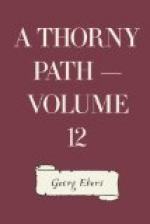CHAPTER XXXIV.
Caracalla’s evening meal was ended, and for years past his friends had never seen the gloomy monarch in so mad a mood. The high-priest of Serapis, with Dio Cassius the senator, and a few others of his suite, had not indeed appeared at table; but the priest of Alexander, the prefect Macrinus, his favorites Theocritus, Pandion, Antigonus, and others of their kidney, had crowded round him, had drunk to his health, and wished him joy of his glorious revenge.
Everything which legend or history had recorded of similar deeds was compared with this day’s work, and it was agreed that it transcended them all. This delighted the half-drunken monarch. To-day, he declared with flashing eyes, and not till to-day, he had dared to be entirely what Fate had called him to be—at once the judge and the executioner of an accursed and degenerate race. As Titus had been named “the Good,” so he would be called “the Terrible.” And this day had secured him that grand name, so pleasing to his inmost heart.
“Hail to the benevolent sovereign who would fain be terrible!” cried Theocritus, raising his cup; and the rest of the guests echoed him.
Then the number of the slain was discussed. No one could estimate it exactly. Zminis, the only man who could have seen everything, had not appeared: Fifty, sixty, seventy thousand Alexandrians were supposed to have suffered death; Macrinus, however, asserted that there must have been more than a hundred thousand, and Caracalla rewarded him for his statement by exclaiming loudly “Splendid! grand! Hardly comprehensible by the vulgar mind! But, even so, it is not the end of what I mean to give them. To-day I have racked their limbs; but I have yet to strike them to the heart, as they have stricken me!”
He ceased, and after a short pause repeated unhesitatingly, and as though by a sudden impulse, the lines with which Euripides ends several of his tragedies:
“Jove
in high heaven dispenses various fates;
And
now the gods shower blessings which our hope
Dared
not aspire to, now control the ills
We
deemed inevitable. Thus the god
To
these hath given an end we never thought.”
—Potter’s translation.
And this was the end of the revolting scene, for, as he spoke, Caesar pushed away his cup and sat staring into vacancy, so pale that his physician, foreseeing a fresh attack, brought out his medicine vial.
The praetorian prefect gave a signal to the rest that they should not notice the change in their imperial host, and he did his best to keep the conversation going, till Caracalla, after a long pause, wiped his brow and exclaimed hoarsely: “What has become of the Egyptian? He was to bring in the living prisoners—the living, I say! Let him bring me them.”




